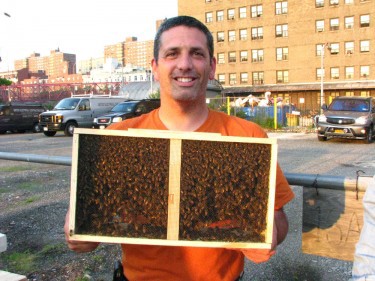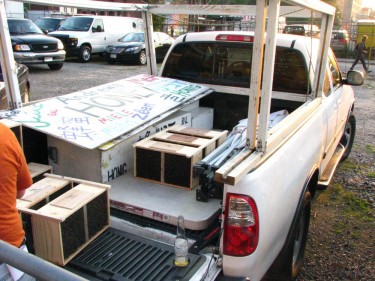When The Bees Swarm: A Q. & A. With Beekeeper Andrew Coté
When The Bees Swarm: A Q. & A. With Beekeeper Andrew Coté
by Russell Brandom

Perhaps you’ve noticed a lot of bee swarms around lately, smothering mailboxes, stopping traffic and entertaining headline writers no less than three times so far this month. As it turns out, it’s bee swarm season — and now that New York is in its second year of legal beekeeping
, the city’s dealing with more restless hives than ever. I tracked down the man who dealt with the recent swarms in Chinatown and Midtown. His name is Andrew Coté, and he’s the president and founder of the New York City Beekeeper’s Association. He tackles the swarms as an unpaid volunteer, armed with a truck, a beekeeper’s suit and a low-suction vacuum.
How did you get involved in last Monday’s swarm?
It came at me from a few different angles. Citizens saw it. People who know about the NYCBA. They contact us through the swarm hotline. When people call and leave a message it sends us a text.
Another way I knew is that a contact at the NYPD called me. And a third way I knew is that I know that that swarm originated in front of 186 Hester St, where it was on a small Gingko tree, and then it disappeared. So I knew they were relocating and it was just a matter of time before they showed up again.
How often does this happen?
Well, this is swarm season. For the last couple of weeks, I don’t think a day has gone by that there hasn’t been a swarm. We’ve had swarms on traffic lights, on the lampposts, fire escapes, trees in front of Bulgari, across the street from Bergdorf Goodman. I’ve been called out to Flatbush Avenue, the Pelham section of the Bronx, Fort Greene, Inwood, the Upper West Side, Upper East Side, and Hester and Elizabeth, which I believe actually came from the same apiary as the one last Monday. In fact, I believe I know whose bees they were, but I want to speak to that person prior to really pointing a finger.
What makes it swarm season?
Millions of years of evolution. Bees need to propogate their species by splitting the hive. Just like when Lucifer left heaven and took a third of the angels with him, so the queen bee takes a third or half of the bees with her when she departs the original hive. That could be compounded by a negligent beekeeper’s laziness in not checking her or his hive for signs of an impending swarm. But I expect that we’ve already peaked and the surge of swarms will be going down now.

Is it happening more than last year, or is that just my imagination?
I think there are more. Last year, when beekeeping became legal, a lot of people got bees, and bees tend not to swarm in their first year. Now this is the second year for many hives in the city, so there’s more of a chance for swarms to split off.
How did you find yourself cleaning up the swarms of New York? Are you a public employee?
I’m unpaid; I’m a volunteer. A couple years ago, the Department of Health and Mental Hygiene asked the NYCBA and me specifically to sit in while they were going over the possibility of making beekeeping legal. I would come into the city, attend meetings, offer advice and criticism. Since then, it’s all on a volunteer basis. I don’t get any sort of compensation, even for transportation.
Why do you do it?
I think that as one of the founders of the NYCBA, there’s a responsibility to keep a positive face on urban beekeeping, and sometimes that means helping out a little. Plus, I’m a New Yorker. I live on the Lower East Side. I care about the city. I love the city.
What do you do with the swarms after you catch them?
The rule is, whoever catches the swarm keeps the swarm. No one can come running up and say, those are my bees, they ran away. That’s just too bad. If they had taken care of their bees, their bees wouldn’t have swarmed. Whoever catches the swarm keeps the swarm. Sometimes that’s me; sometimes that’s another beekeeper I’m working with on that day, or someone else entirely.
How much of a threat do these swarms pose to people?
Zero. Think of a dog. If you kick the dog, the dog may become a threat whereas otherwise the dog would have been docile. Bees are at their most docile when they swarm. They leave the hive full of food, almost bloated, and they have no hive to defend at that point. I would think that if someone would go past a swarm of bees that the person would be intrigued or even frightened. But if they would just call our hotline, someone would be grateful to have the chance to take that swarm safely and quickly away.
Russell Brandom is worried he will be stung to death by bees.
